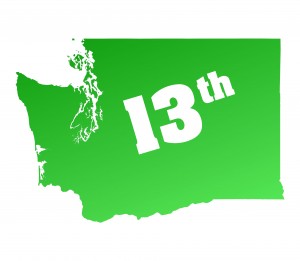Lucky 13? WA population keeps on growing
 New Census projections show that we’re on the move in Washington — people moving in from other states and folks having babies. In the past decade, we’ve grown by 13 percent and are now the 13th largest state! And it could be Lucky 13 if we wind up gaining a new congressional seat.
New Census projections show that we’re on the move in Washington — people moving in from other states and folks having babies. In the past decade, we’ve grown by 13 percent and are now the 13th largest state! And it could be Lucky 13 if we wind up gaining a new congressional seat.
We’ve grown by nearly 100,000 during the last year and — drum roll please — our new statewide population number is nearly 6.7 million. It’s 6,664,195, up over 770,000 from the April, 2000, number of 5,894,143.
A decade ago, we were the 15th most populous state.
Is our population growth enough to pick up a 10th congressional seat? It’s too early to say for sure, especially since the new national Census of 2010 still awaits, to give us the official numbers. A year ago, the analysts at Election Data Services put us in the small cluster of states that could vie for the 435th and final congressional seat. Oregon is another possible winner. Some states are losing population relative to the rest of the country and others are growing faster than most of the rest of the USA.
The rejiggering of the 435 districts among the states, to make representation more equitable, is called “reapportionment.”
Once we know for sure how many districts we have, the US and state constitutions require us to “redistrict,” meaning to redraw our districts (both congressional and legislative) so that they are of equal population.
In Washington, happily, a voter-approved constitutional amendment assigns that duty not to the Legislature, but to a bipartisan citizen commission — two Rs and two Ds are the voting members and they appoint a fifth person to serve as non-voting chair. Maps must be agreed to by at least three commissioners, and the Legislature’s vote is basically up-or-down. This process already is under way at the staff level at the state Elections Division, and commissioners will be picked in 2011. New districts take effect in 2012.